Daily Vocabulary Words: List of Daily Used Words in Leading Indian Newspapers
Hi there. Welcome to this special section @ Wordpandit. Our endeavour here is straightforward: highlighting daily vocabulary words that you would come across in leading newspapers in the country. We have included the following newspapers in our selection:
• The Times of India
• The Economic Times
• Hindustan Times
• Mint
• Indian Express
We are putting in extensive work to develop your vocabulary. All you have to do is be regular with this section and check out this post daily. This is your repository of commonly used words; essentially, we are posting a list of daily used words. Hence, this has significant practical application as it teaches you words that are commonly used in leading publications mentioned above.
Visit the website daily to learn words from leading Indian newspapers.
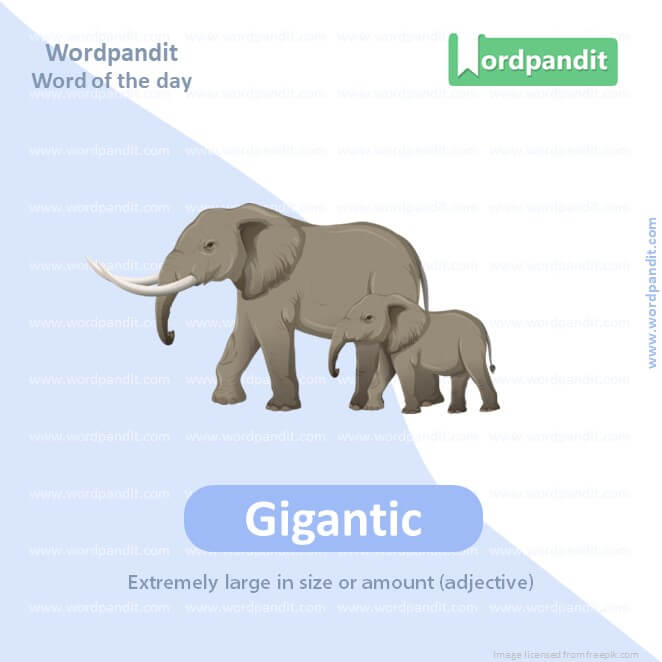
WORD-1: Gigantic
CONTEXT: As the world warms up, gigantic clusters of polyp growth elsewhere that once throbbed with marine life have already gone past that stage of stress and turned fully skeletal.
SOURCE: Live Mint
EXPLANATORY PARAGRAPH: Imagine a dinosaur that’s as tall as a building. It’s “gigantic,” which means very, very big!
MEANING: Extremely large in size or amount (adjective).
PRONUNCIATION: jai-GAN-tik
SYNONYMS: enormous, huge, colossal, immense, massive, vast
USAGE EXAMPLES:
1. The gigantic statue towered over the city square.
2. He took a gigantic bite out of the watermelon.
3. The spaceship in the movie looked gigantic compared to the people.
4. They bought a gigantic teddy bear for the child’s birthday.
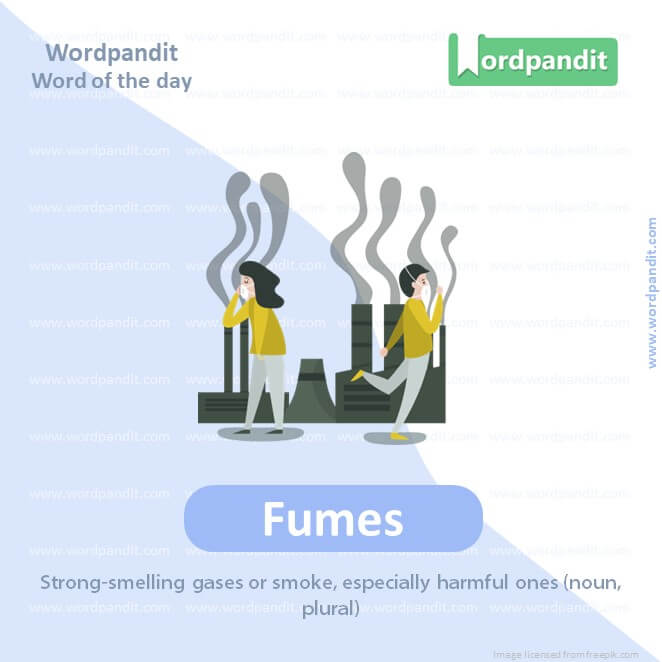
WORD-2: Fumes
CONTEXT: To conserve the natural beauty that Lakshadweep hides under its aqua-marine tides, we must choke off carbon fumes.
SOURCE: Live Mint
EXPLANATORY PARAGRAPH: Imagine a car that’s puffing out smoky clouds from its tailpipe. Those smoky clouds are called “fumes.” They are strong-smelling gases or smoke.
MEANING: Strong-smelling gases or smoke, especially harmful ones (noun, plural).
PRONUNCIATION: fyoomz
SYNONYMS: smoke, vapors, gases, emissions, exhaust
USAGE EXAMPLES:
1. The workers wore masks to protect themselves from the paint fumes.
2. Exhaust fumes filled the garage when the car engine was left running.
3. The burning plastic released toxic fumes into the air.
4. She coughed as she walked through the kitchen filled with cooking fumes.
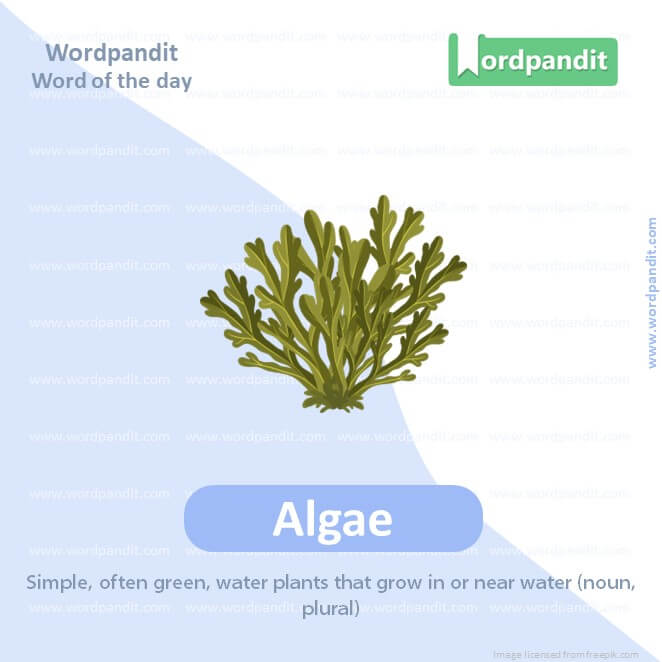
WORD-3: Algae
CONTEXT: Most of these live in a deep symbiotic relationship with tiny algae that cling around as nutrient suppliers.
SOURCE: Live Mint
EXPLANATORY PARAGRAPH: Imagine tiny green plants floating on the surface of a pond. Those plants are called “algae.” They live in water and can look like green scum or strands.
MEANING: Simple, often green, water plants that grow in or near water (noun, plural).
PRONUNCIATION: AL-jee
SYNONYMS: seaweed, phytoplankton, water plants
USAGE EXAMPLES:
1. The pond was covered in a layer of green algae.
2. Scientists study algae to learn about water pollution.
3. Fish eat algae as part of their diet in the ocean.
4. The swimming pool needed cleaning due to algae buildup.
WORD-4: Snorkellers
CONTEXT: The dazzling colours that snorkellers love are signals of mutually assured health.
SOURCE: Live Mint
EXPLANATORY PARAGRAPH: Imagine swimming in the ocean while wearing a mask and a tube to breathe through so you can see all the colorful fish below. Those people are called “snorkellers.”
MEANING: People who swim underwater using a breathing tube called a snorkel (noun, plural).
PRONUNCIATION: SNOR-kel-erz
SYNONYMS: divers, swimmers, underwater explorers
USAGE EXAMPLES:
1. The snorkellers were amazed by the coral reefs they saw.
2. Several snorkellers explored the underwater cave together.
3. Snorkellers love swimming near the rocks to see the colorful fish.
4. The guide led a group of snorkellers through the shallow waters.
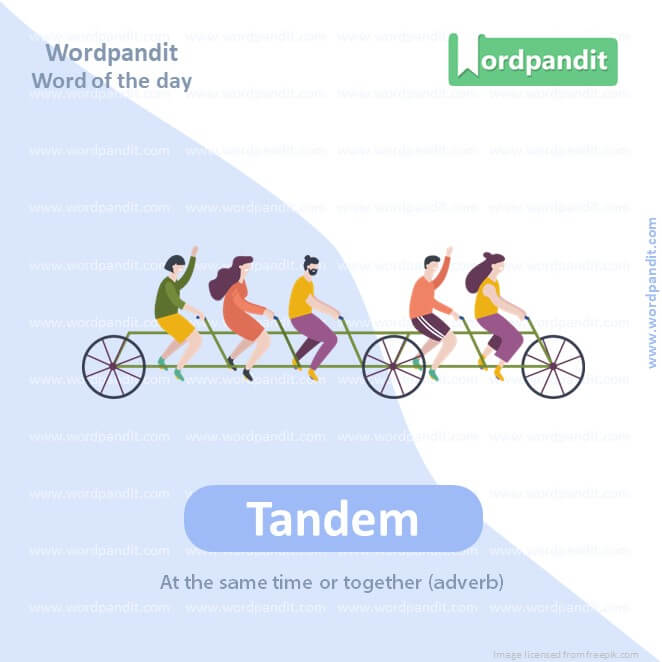
WORD-5: Tandem
CONTEXT: The problem is the central bank’s liabilities, which necessarily have increased in tandem with its assets.
SOURCE: Live Mint
EXPLANATORY PARAGRAPH: Imagine two friends riding one bike together, one behind the other. They’re riding “in tandem.” It means doing something together at the same time or one after another.
MEANING: One behind the other (noun). At the same time or together (adverb).
PRONUNCIATION: TAN-duhm
SYNONYMS: together, in unison, simultaneously, consecutively, sequentially
USAGE EXAMPLES:
1. The two cyclists rode the tandem bicycle down the street.
2. The pilots flew in tandem, one plane following the other.
3. The musicians worked in tandem to create a beautiful song.
4. The children took turns swinging in tandem at the playground.
WORD-6: Minuscule
CONTEXT: It wasn’t always this way. Before the 2008 panic, reserve balances were minuscule relative to the size of the economy—in the low tens of billions.
SOURCE: Live Mint
EXPLANATORY PARAGRAPH: Imagine a tiny ant that you can barely see because it’s so small. That’s “minuscule,” which means very, very tiny.
MEANING: Extremely small in size or amount (adjective).
PRONUNCIATION: MIN-uh-skyool
SYNONYMS: tiny, microscopic, minute, diminutive, little, small
USAGE EXAMPLES:
1. The ant is so minuscule that you need a magnifying glass to see it clearly.
2. The difference between the two products was minuscule.
3. Despite being minuscule, the gemstone was worth a lot of money.
4. He made a minuscule mistake in his calculations, but it had a big impact.
WORD-7: Shriveled
CONTEXT: Banks now rely primarily on reserve accounts rather than overnight borrowing to satisfy liquidity requirements, and that overnight market has shriveled.
SOURCE: Live Mint
EXPLANATORY PARAGRAPH: Imagine a grape that has dried up into a raisin. It’s “shriveled,” which means something has become wrinkled and smaller.
MEANING: Wrinkled and reduced in size due to drying up (adjective, verb, past tense).
PRONUNCIATION: SHRIV-uhld
SYNONYMS: withered, dried up, wrinkled, shrunken, contracted
USAGE EXAMPLES:
1. The flowers shriveled up after being left in the sun.
2. His hands looked shriveled after being in the pool for too long.
3. The heat shriveled the leaves of the plant.
4. The fruit had shriveled and was no longer edible.
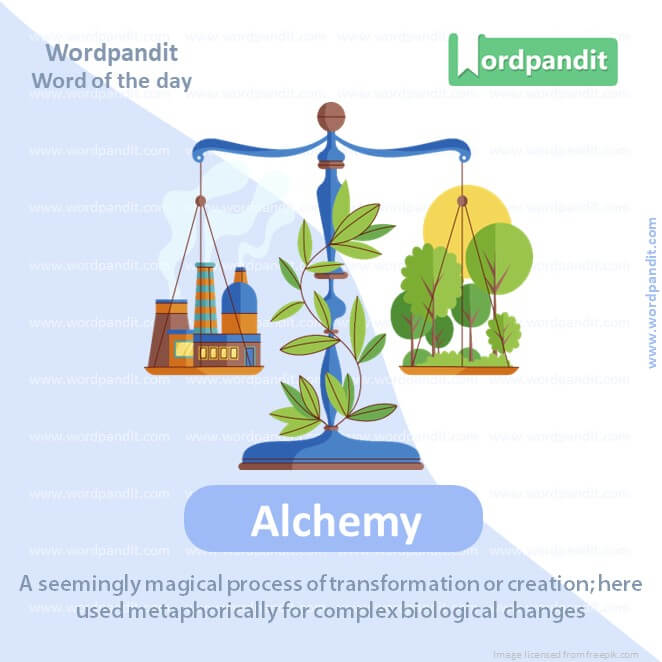
WORD-8: Alchemy
CONTEXT: The quantity of reserves banks want to hold arises from a complex alchemy of regulation, market forces and managerial preferences.
SOURCE: Live Mint
EXPLANATORY PARAGRAPH: Imagine mixing different potions together to make gold. That’s like “alchemy,” which is the old idea of turning ordinary things into something valuable.
MEANING: A seemingly magical process of transformation or creation; here
used metaphorically for complex biological changes.
PRONUNCIATION: AL-kuh-mee
SYNONYMS: sorcery, wizardry, magic, transformation, transmutation
USAGE EXAMPLES:
1. The medieval alchemists tried to find the secret to eternal life through alchemy.
2. Some people still believe in the mystical power of alchemy.
3. In literature, alchemy often symbolizes transformation and magic.
4. He likened the creative process to a kind of modern-day alchemy.
WORD-9: Portrayed
CONTEXT: Depictions of violence, for example, can leave deep imprints, which is why the identities of perpetrators portrayed are a touchy subject.
SOURCE: Live Mint
EXPLANATORY PARAGRAPH: Imagine drawing a picture of your favorite animal so others can see what it looks like. You “portrayed” it, which means you showed or represented something in a certain way.
MEANING: Showed or represented in a certain way, often in art or writing (verb, past tense).
PRONUNCIATION: por-TRAYD
SYNONYMS: depicted, represented, illustrated, described, presented
USAGE EXAMPLES:
1. The artist portrayed the king as strong and wise in his painting.
2. The movie portrayed the hero as brave and kind.
3. She was portrayed as a villain in the book, even though she did nothing wrong.
4. The TV show portrayed life in the village realistically.
WORD-10: Ethos
CONTEXT: Subconsciously, they imbibed a circular-economy ethos, with thriftiness and sustainability their daily norms.
SOURCE: Live Mint
EXPLANATORY PARAGRAPH: Imagine a school where everyone believes in working hard and being kind to each other. That’s their “ethos,” which means the values or spirit of a group.
MEANING: The beliefs, values, or spirit of a particular group, organization, or community (noun).
PRONUNCIATION: EE-thos
SYNONYMS: spirit, culture, values, beliefs, principles, philosophy
USAGE EXAMPLES:
1. The school’s ethos is based on respect and cooperation.
2. The company promotes an ethos of creativity and teamwork.
3. The artist captured the ethos of the 1960s in his paintings.
4. Their ethos encourages sustainable and eco-friendly practices.
Vocabulary Pronunciation
The dance of language learning comprises two inseparable partners: vocabulary and pronunciation. The rhythm of this dance is best enjoyed when both partners are in sync. Essentially, mastering ‘vocabulary pronunciation’ is key to expressing and understanding a language effectively. However, what is the ideal approach to learn ‘vocabulary pronunciation’?
Firstly, the process of learning ‘vocabulary pronunciation’ isn’t a sprint. Rather, it’s a marathon where consistency is vital. A gradual and steady pace of learning new words and their pronunciation offers enough time to effectively practice and commit them to memory.
Secondly, to master ‘vocabulary pronunciation’, go beyond written text. Dwell in the world of audible language, such as documentaries, podcasts, music, or language-learning apps that provide pronunciation guides. These memorable auditory experiences aid in refining your ‘vocabulary pronunciation’ and offer a glimpse into the authentic sounds of the language.
Another beneficial strategy for learning ‘vocabulary pronunciation’ involves the use of phonetic transcriptions. They offer systematic approaches to understanding the sound system of a language, thereby improving pronunciation.
Most importantly, do not shy away from practicing your ‘vocabulary pronunciation’. Be it in a language exchange meeting, a conversation with a native speaker, or even a self-recording session, active verbalization massively boosts your pronunciation prowess.
Lastly, always remember to train your ears as much as you train your tongue. Listening carefully to native speakers helps you capture the subtleties of ‘vocabulary pronunciation’, contributing to better delivery when you speak.
In conclusion, mastering ‘vocabulary pronunciation’ is not an overnight journey. It’s a process of intentional practice, sustained listening, conscientious reflection and active usage. As you chart this course with diligence and patience, you will witness your ‘vocabulary pronunciation’ skills blossom, leading you to communicate with greater fluency and confidence.











